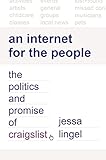An Internet for the people : the politics and promise of Craigslist / Jessa Lingel.
Material type: TextLanguage: English Series: Princeton studies in culture and technology | Princeton studies in culture and technologyPublisher: Princeton, NJ : Princeton University Press, 2020Description: viii, 197 pages : illustrations ; 24 cmContent type:
TextLanguage: English Series: Princeton studies in culture and technology | Princeton studies in culture and technologyPublisher: Princeton, NJ : Princeton University Press, 2020Description: viii, 197 pages : illustrations ; 24 cmContent type: - text
- unmediated
- volume
- 9780691188904 (hardback ; alk. paper)
- 0691188904 (hardback ; alk. paper)
- 381/.14206573
- HF 6146 L755i 2020
| Item type | Current library | Home library | Collection | Shelving location | Call number | Copy number | Status | Barcode | |
|---|---|---|---|---|---|---|---|---|---|
 Libro
Libro
|
Biblioteca Juan Bosch | Biblioteca Juan Bosch | Ciencias Sociales | Ciencias Sociales (3er. Piso) | HF 6146 L755i 2020 (Browse shelf(Opens below)) | 1 | Available | 00000191519 |
Includes bibliographical references and index.
Becoming Craig's List : San Francisco roots and Web 1.0 ethics
The death and life of classified ads : a media history of craigslist
From sex workers to data hacks : craigslist's courtroom battles
Craigslist, the secondary market, and politics of value
Craigslist gigs, class politics, and a gentrifying Internet
People seeking people : craigslist, online dating, and social stigma
Craigslist's people problems : politics and failures of trust
Conclusion : the case for keeping the internet weird
"This book argues that craigslist issues a quiet challenge to the corporate norms that have become dominant in the twenty-first century web. More than a window to the world's ephemera, craigslist is an increasingly lonely outpost in a hyper-corporate web. It is the internet un-gentrified, representing an older ideological orientation of online politics, one that stresses technological simplicity, collectivism, and locality. Flawed and ever on the brink of obsolescence, it provides a model of how democracy can work - most of the time for most people - online. The first part of the book provides historical context for understanding craigslist, describing craigslist's transformation from an email list to a massively popular online marketplace and examining the development of classified and personal ads through the arrival of the digital age. Lingel also examines craigslist's legal history, looking at the company's battles over issues of freedom of expression and data privacy, and exploring what the company's defenses in the courtroom reveal about the platform's politics. The second part of the book explores how people use craigslist in everyday life, and the publics and politics that emerge from their daily online interactions. One chapter draws on interviews with craigslist users to examine the relationships between people and things in craigslist's secondary marketplace. Another looks at how jobs are advertised and filled on craigslist, and the shifting norms and associated class biases that result from craigslist job-seeking practices. Lastly, Lingel examines the problems that are created and solved as people buy and sell, find jobs and gigs, connect to, exploit, and protect each other on craigslist, showing how the community negotiates, establishes, and polices rules and norms. By looking at the politics and promises of craigslist, Lingel concludes, we can also reflect on how the web has evolved, how it has stayed the same, what we might want to protect and what we should think about changing when it comes to everyday life online"-- Provided by publisher.
There are no comments on this title.

